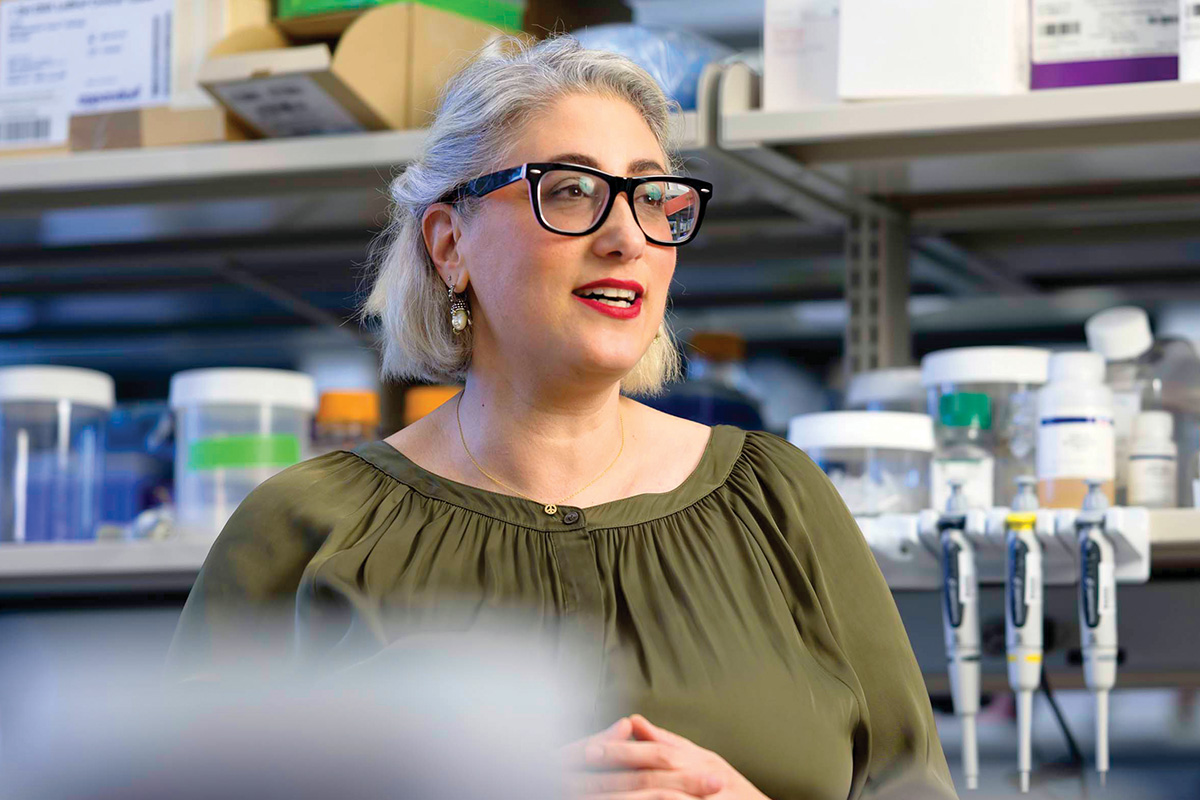
Chimpanzees are our closest living relatives, descending from the same species as humans more than 6 million years ago. The fact that we share 98.8% of our genes with chimps explains fascinating similarities in our behaviors and our bodies. But the remaining 1.2% of genes explains the many significant differences. One of these differences is that humans have a much higher rate of cancer than chimps, and it’s not all due to our different living environments.
In an unusual collaboration, researchers from Memorial Sloan Kettering Cancer Center (MSK) and the American Museum of Natural History (AMNH) in New York City combined their expertise in people and primates for a recent study published in Cell Reports.
“Other studies that have focused on understanding cancer genetics, like TCGA [The Cancer Genome Atlas], have used very large sets of human data,” says MSK physician-scientist Christine Iacobuzio-Donahue, senior author of the paper. “We thought it would be interesting to take a different approach. Rather than comparing genes between humans, we would compare genes between humans and our nearest relatives on the tree of life. This paper has been years in the making.”
Dr. Iacobuzio-Donahue frequently collaborates with scientists from AMNH, using computational tools developed to study the evolution of species to instead study the evolution of cancer.
A Well-Known Breast Cancer-Associated Gene in People vs. Chimps
For this research, the scientists first collected all available public data on the genomes of humans as well as 12 species of nonhuman primates. Then they started looking at differences in the genes. They focused on the genes that were most likely to have widespread influence — because they make protein products that bind to DNA or other proteins.
“We were not looking for any particular genes,” Dr. Iacobuzio-Donahue says. “We just wanted to look for differences that changed the function of the protein between primates and humans.”
The investigators zeroed in on one particular gene: BRCA2. This gene is linked to several different cancers in humans, including breast, ovarian, prostate, and pancreatic tumors. In particular, the team found a change in one amino acid in the human samples that was absent from the primates. “This was exciting and interesting, because BRCA2 is so important in cancer biology,” Dr. Iacobuzio-Donahue says.
A Mutation That Makes It Harder To Repair Damaged DNA
The BRCA2 protein plays a crucial role as a tumor suppressor. It is responsible for correcting errors in other genes that otherwise can lead to cancer. That’s why people who have a defective BRCA2 gene are more susceptible to cancer.

Having discovered a key difference between chimp and human DNA, Dr. Iacobuzio-Donahue decided to reach out to a colleague at the Sloan Kettering Institute (SKI) — molecular biologist Maria Jasin, who is internationally recognized for studying the BRCA genes and their role in repairing DNA breaks during cell division. Dr. Jasin is a member of SKI’s Developmental Biology Program.
Travis White, a senior research scientist in the Jasin Lab, was able to engineer a model of the BRCA2 mutation and measure its effects. “Our lab has longstanding studies designed to probe the functions of the BRCA2 protein,” Dr. White says. “We have a lot of experience in figuring out how these systems work.”
The lab models revealed that the newly discovered mutation appears to make BRCA2 less functional. It’s defined by a specific change in the 2662 codon. (Codons are sequences of three nucleotides that determine which amino acid is inserted into a protein.) The investigators concluded that the change in this codon found in humans results in a 20% reduction in the protein’s ability to repair DNA damage compared with the version of BRCA2 that’s found in chimps.
Applying Discoveries About Chimps to Humans
Dr. Iacobuzio-Donahue says she’s already beginning to look at ways to apply these findings to the development of new cancer treatments. For example, it may be possible to take advantage of this mutation in human BRCA2 to make drugs called PARP inhibitors more effective.
Another finding was that this BRCA2 mutation appears to boost fertility. Previous studies also have suggested that women who carry the BRCA2 variants linked to cancer become pregnant more easily. This enhanced fertility could explain how the 2662 codon mutation has been able to thrive across hundreds of thousands of years of evolution: The reproductive advantage far outweighed the slight increase in cancer risk.
Because of the fertility link, Dr. Iacobuzio-Donahue says it’s also worth exploring whether these discoveries could have applications for developing new treatments for certain types of infertility. She also has plans to study other mutations found through her collaboration with the scientists at the museum.
“This discovery opens the door for trying to understand which mutations have provided survival advantages over hundreds of thousands of years,” Dr. White says. “It’s a really intriguing first step for figuring out what these kinds of mutations are doing for our species.”
Dr. Iacobuzio-Donahue is excited by the broad-reaching possibilities, saying: “This research demonstrates how evolutionary biology approaches can reveal a lot about human diseases — not just cancer but other conditions as well.”


